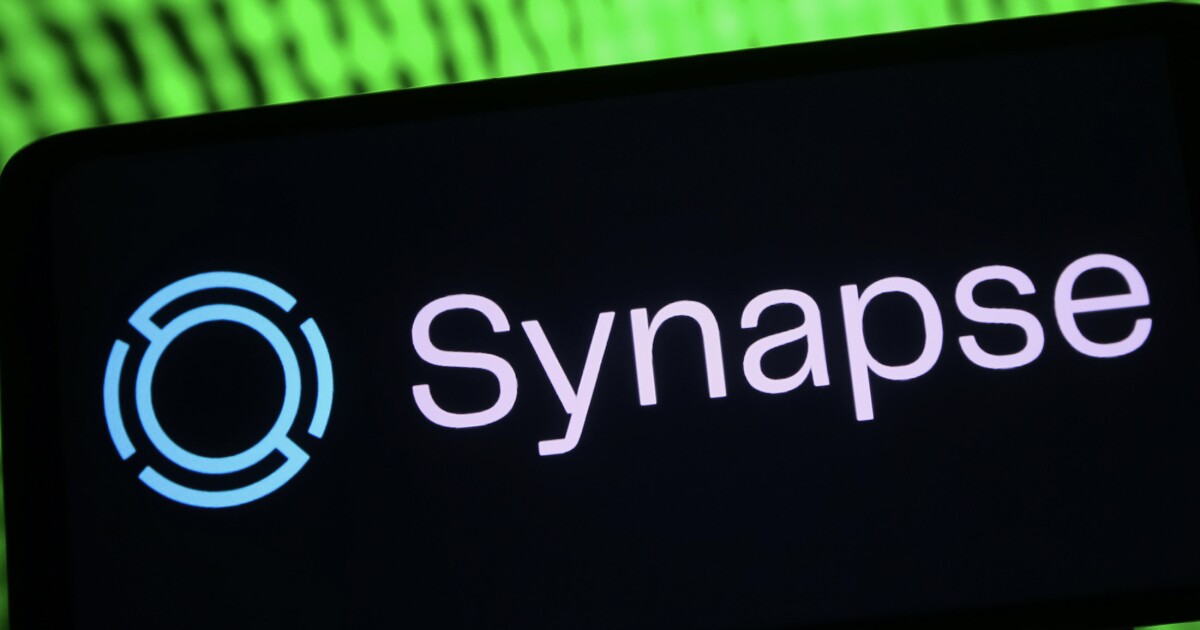Fintech
“It’s Always a Black Box”: The Ordeal of a Fintech Working with Synapse

Turbulence in the banking-as-a-service sector is stimulating banks, fintech AND middleware providers carefully evaluate which customers or partners to choose.
Artem Fedyaev, CEO and co-founder of challenger bank GrabrFi, has seen this crisis firsthand. In 2021, he tried to launch GrabrFi as an offshoot of Grabr, the peer-to-peer marketplace he created in 2015. GrabrFi is designed for freelancers and remote workers who live outside the US but earn income from US-based companies. It allows users in 28 countries to open US checking accounts, where they can receive their salaries in US dollars.
Over the next three years, he partnered with three different middleware vendors, including Synapse, and rotated between several potential sponsor banks in an effort to bring his idea to market.
Fedyaev’s account of his experience highlights both the shortcomings and opportunities in the BaaS middleware space. On the one hand, handing over some control to middleware companies has led to complications and opacity. Middleware providers are, by and large, vendors that connect banks to fintechs and provide matchmaking and technology services. It has often taken GrabrFi months longer than expected to integrate with a new provider.
On the other hand, the company’s current vendor, Synctera, has been instrumental in connecting GrabrFi to a partner bank relationship that has so far gone smoothly. In theory, middleware companies that have multiple partner banks can help fintech clients secure more than one BaaS sponsor. This was once seen as a luxury, but may be an existential necessity as more BaaS banks have problems with regulators and their partners are at risk serious disruptions.
GrabrFi’s story is also representative of an evolving mindset among financial services startups.
“In the past, fintechs looking for a bank partner prioritized speed and flexibility, where the faster they could go to market the better, and the more flexibility the bank had on terms the better,” said Jonah Crane, partner at Klaros Group. Now, “people are choosy about the banks they work with.”
When they conceived of GrabrFi, Fedyaev and his team estimated that there were 120 million people in other countries working overseas for U.S. companies and potentially receiving their salaries in U.S. dollars. Through his network of investors, Fedyaev spoke to several potential partner banks in 2021 about his idea for a challenger bank.
“They all said the same thing: it was a huge use case and a big market, but it was too risky for KYC. [know-your-customer] side because it is international and digitalized,” he said.
Their confirmation that the market was there encouraged him to continue. The next step was to talk to BaaS middleware vendors, most of whom echoed the banks’ concerns about the potential for fraud, money laundering, and other risks.
“Now I understand, but then I argued with them,” Fedyaev said.
GrabrFi has made progress with one company, Treasury Prime. Fedyaev says he spent four months building GrabrFi using technology and documentation provided by Treasury Prime, and had a sponsor bank willing to hold GrabrFi deposits. But a week before the launch in August 2021, the sponsor bank laid out a condition that GrabrFi saw as a deciding factor: 90% of accounts must be reserved for U.S. citizens and residents.
“For us it was not a deal,” Fedyaev said. “There was too much competition in the United States. Our vision was to go immediately into global space.”
In a statement, Treasury Prime said it has “always required that fintech clients have a direct contractual relationship with the bank. Therefore, the fintech must pass the bank’s due diligence and any other requirements related to account opening.”
When Fedyaev resumed conversations with BaaS providers who had rejected GrabrFi several months earlier, he found greater willingness.
“Things are changing rapidly in this industry,” Fedyaev said. “Everyone was looking for growth.”
Fedyaev claims that Synapse promised GrabrFi it could launch in three to four months. Instead, Fedyaev says it took GrabrFi more than a year to integrate the technology, wait for compliance approvals, and conduct due diligence, which included drafting disclosures, terms of use, and know-your-customer programs for each country where GrabrFi wanted to launch.
“Ultimately, it’s a good thing,” Fedyaev said. “Compliance is very important.”
But in his experience, some of the features Synapse had promised to support were still in development, such as the ability for users to transfer money via SWIFT.
Synapse did not respond to a request for comment. The company declared bankrupt in April and has been ever since mired in legal proceedings as millions of dollars in end-user funds remain unaccounted for.
“That’s how a lot of the BaaS providers phrase it. ‘Do you have this?’ The answer is ‘yes’ when they try to sell it to you,” Fedyaev said. “You sign the contract and realize they’re still building it.”
At the same time, Fedyaev acknowledges that many of these companies are startups themselves and may have underestimated the demand for their services.
Problems with Synapse persisted. A week before GrabrFi was set to go live in July 2022, Fedyaev learned through Synapse that his original sponsor bank would no longer accept new programs and that GrabrFi would have to switch to another. Integration with a second bank took a few more months.
“Because we invested so much, we kept waiting, paying salaries, pushing marketing campaigns further and further, telling investors we’re almost there,” Fedyaev said. “Everyone is getting impatient.”
He said he had had no contact with the banks in question, nor with GrabrFi’s debit card issuer.
“It’s always a black box,” he said. “When you try to reach out to people through LinkedIn, they don’t respond because they don’t know who you are.”
Carey Ransom, managing director of BankTech Ventures, a venture capital fund, also has firsthand experience with BaaS. He was a co-founder of Payoff, a consumer loan now Happy Money, and the COO of an environmentally focused challenger bank. AspirationIn both cases, he worked directly with the banks.
“I’ve always had concerns about middleware companies that sneak in between fintech and banking partnerships,” Ransom said.
In his previous life as a fintech executive, “We had to make sure we knew who was opening accounts,” he said. “Middleware companies created this confusion on both sides and created risks that some fintechs don’t even realize.”
GrabrFi launched in January 2023. Fedyaev said it had amassed tens of thousands of customers in its first year. But problems arose. A shareholder Fedyaev trusted introduced him to Peter Hazlehurst, co-founder and CEO of Synctera, another middleware vendor, in May. Fedyaev decided to migrate.
“I liked that they didn’t push me to sign anything,” Fedyaev said. “They were transparent about what features they had and didn’t have.” Synctera also required a potential sponsor bank to feel comfortable with GrabrFi before signing the contract.
Fedyaev flew to Tulsa, Okla., to meet in person with Regent Bank, which has $1.7 billion in assets, something the bank prefers, said Steve Baker, chief innovation officer at Regent.
“Because of our experience, it wasn’t them doing due diligence on us and us saying, ‘Please work with us,’” Fedyaev said. “We wanted to make sure that if we did it a third time, we could scale long-term and there wouldn’t be any surprises a week before launch.”
He asked questions like, “If I acquire a million customers in Argentina next year, will regulators come after you?” and “Are you going to ask me to set a quota on how many accounts we can have?”
GrabrFi relaunched in January 2024 with Synctera and Regent. The overall migration took longer than the three to four months estimated (everyone says that, Fedyaev said) and took about seven months from the time GrabrFi presented its use case to Synctera. But half of that time was spent meeting with the bank and doing the groundwork to begin integration, Fedyaev said. GrabrFi uses a combination of compliance tools from Synctera and independently sourced vendors, such as Stripe Identity for international KYC checks. All of its compliance policies are reviewed by Regent Bank.
For its part, Regent has been active in the BaaS sector for 20 months, with around 15 partners, most of which came through referrals from Synctera.
Fedyaev appreciates the direct line he has with Regent. For example, if Regent is suspicious of a transaction or account, “They contact us immediately,” he said. “We can make a change within 24 hours.”
He also likes the flexibility of the BaaS arrangement. While neither Regent nor Synctera offer remittances, they were open to GrabrFi finding a third party to develop such a feature, subject to approval. Fedyaev says remittance will launch this summer.
Crane expects Synctera’s model to represent the direction middleware is moving.
“I’m the facilitator, not the main counterpart,” he said. “Ultimately, [fintechs] will have a direct relationship with the bank and the middleware provider is an important technology layer.”
One challenge looming on Crane’s radar, however, is how these parties will come together to get small fintechs off the ground.
“As the bar gets higher on how to manage these partnerships in a compliant way, it becomes harder to see how it will work for small fintechs,” Crane said. “Banks want large-scale, well-established programs. It will be harder for new fintechs to find a home.”
Fintech
Lloyds and Nationwide invest in Scottish fintech AI Aveni

Lloyds Banking Group and Nationwide have joined an £11m Series A funding round in Scottish artificial intelligence fintech Aveni.
The investment is led by Puma Private Equity with additional participation from Par Equity.
Aveni creates AI products specifically designed to streamline workflows in the financial services industry by analyzing documents and meetings across a range of operational functions, with a focus on financial advisory services and consumer compliance.
The cash injection will help fund the development of a new product, FinLLM, a large-scale language model created specifically for the financial sector in partnership with Lloyds and Nationwide.
Joseph Twigg, CEO of Aveni, explains: “The financial services industry doesn’t need AI models that can quote Shakespeare, it needs AI models that offer transparency, trust and, most importantly, fairness. The way to achieve this is to develop small, highly tuned language models, trained on financial services data, vetted by financial services experts for specific financial services use cases.
“FinLLM’s goal is to set a new standard for the controlled, responsible and ethical adoption of generative AI, outperforming all other generic models in our selected financial services use cases.”
Robin Scher, head of fintech investment at Lloyds Banking Group, says the development programme offers a “massive opportunity” for the financial services industry by streamlining operations and improving customer experience.
“We look forward to supporting Aveni’s growth as we invest in their vision of developing FinLLM together with partners. Our collaboration aims to establish Aveni as a forerunner in AI adoption in the industry, while maintaining a focus on responsible use and customer centricity,” he said.
Fintech
Fairexpay: Risk consultancy White Matter Advisory acquires 90% stake in fintech Fairexpay

Treasury Risk Consulting Firm White Matter Alert On Monday he announced the acquisition of a 90% stake in the fintech startup Fair payment for an undisclosed amount. The acquisition will help White Matter Advisory expand its portfolio in the area of cross-border remittance and fundraising services, a statement said. White Matter Advisory, which operates under the name SaveDesk (White Matter Advisory India Pvt Ltd), is engaged in the treasury risk advisory business. It oversees funds under management (FUM) totaling $8 billion, offering advisory services to a wide range of clients.
Improve your technology skills with high-value skills courses
| IIT Delhi | Data Science and Machine Learning Certificate Program | Visit |
| Indian School of Economics | ISB Product Management | Visit |
| MIT xPRO | MIT Technology Leadership and Innovation | Visit |
White Matter Advisory, based in Bangalore, helps companies navigate the complexities of treasury and risk management.
Fairexpay, authorised by the Reserve Bank of India (RBI) under Cohort 2 of the Liberalised Remittance Scheme (LRS) Regulatory Sandbox, boasts features such as best-in-class exchange rates, 24-hour processing times and full security compliance.
“With this acquisition, White Matter Advisory will leverage Fairexpay’s advanced technology platform and regulatory approvals to enhance its services to its clients,” the release reads.
The integration of Fairexpay’s capabilities should provide White Matter Advisory with a competitive advantage in the cross-border remittance and fundraising market, he added.
The release also states that by integrating Fairexpay’s advanced technology, White Matter Advisory aims to offer seamless and convenient cross-border payment solutions, providing customers with secure options for international money transfers.
Fintech
Rakuten Delays FinTech Business Reorganization to 2025

Rakuten (Japan:4755) has released an update.
Rakuten Group, Inc. and Rakuten Bank, Ltd. announced a delay in the reorganization of Rakuten’s FinTech Business, moving the target date from October 2024 to January 2025. The delay is to allow for a more comprehensive review, taking into account regulatory, shareholder interests and the group’s optimal structure for growth. There are no anticipated changes to Rakuten Bank’s reorganization objectives, structure or listing status outside of the revised timeline.
For more insights on JP:4755 stock, check out TipRanks Stock Analysis Page.
Fintech
White Matter Advisory Acquires 90% Stake in Fintech Startup Fairexpay

You are reading Entrepreneur India, an international franchise of Entrepreneur Media.
White Matter Advisory, which operates under the name SaveDesk in India, has announced that it is acquiring a 90% stake in fintech startup Fairexpay for an undisclosed amount.
This strategic move aims to strengthen White Matter Advisory’s portfolio in cross-border remittance and fundraising services.
By integrating Fairexpay’s advanced technology, White Matter Advisory aims to offer seamless and convenient cross-border payment solutions, providing customers with secure options for international money transfers.
White Matter Advisory, known for its treasury risk advisory services, manages funds under management (FUM) totaling USD 8 billion.
Founded by Bhaskar Saravana, Saurabh Jain, Kranthi Reddy and Piuesh Daga, White Matter Advisory helps companies effectively manage the complexities of treasury and risk management.
The SaveDesk platform offering includes a SaaS-based FX market data platform with real-time feeds for over 100 currencies, bank cost optimization services, customized treasury risk management solutions, and compliance guidance for the Foreign Exchange Management Act (FEMA) and other trade regulations.
Fairexpay is a global aggregation platform offering competitive currency exchange rates from numerous exchange partners worldwide. Catering to both private and corporate customers, Fairexpay provides seamless money transfer solutions for education, travel and immigration, as well as simplifying cross-border payments via API and white-label solutions for businesses. Key features include competitive currency exchange rates, 24-hour processing times, extensive currency coverage of over 30 currencies in more than 200 countries, and secure, RBI-compliant transactions.
-

 DeFi1 year ago
DeFi1 year agoSwitchboard Revolutionizes DeFi with New Oracle Aggregator
-

 News1 year ago
News1 year agoLatest Business News Live Updates Today, July 11, 2024
-

 DeFi1 year ago
DeFi1 year agoIs Zypto Wallet a Reliable Choice for DeFi Users?
-

 DeFi1 year ago
DeFi1 year ago👀 Lido prepares its response to the recovery boom
-

 Fintech1 year ago
Fintech1 year agoFinTech LIVE New York: Mastercard and the Power of Partnership
-

 DeFi1 year ago
DeFi1 year agoEthena downplays danger of letting traders use USDe to back risky bets – DL News
-

 Fintech1 year ago
Fintech1 year ago121 Top Fintech Companies & Startups To Know In 2024
-

 ETFs1 year ago
ETFs1 year agoGold ETFs see first outing after March 2023 at ₹396 cr on profit booking
-

 DeFi1 year ago
DeFi1 year agoTON Network Surpasses $200M TVL, Boosted by Open League and DeFi Growth ⋆ ZyCrypto
-

 Fintech1 year ago
Fintech1 year agoFintech unicorn Zeta launches credit as a UPI-linked service for banks
-

 ETFs1 year ago
ETFs1 year agoLargest US Bank Invests in Spot BTC ETFs While Dimon Remains a Bitcoin Hater ⋆ ZyCrypto
-

 News1 year ago
News1 year agoSalesforce Q1 2025 Earnings Report (CRM)

















